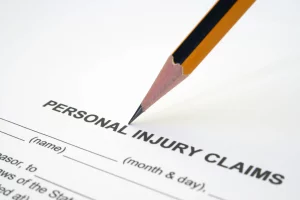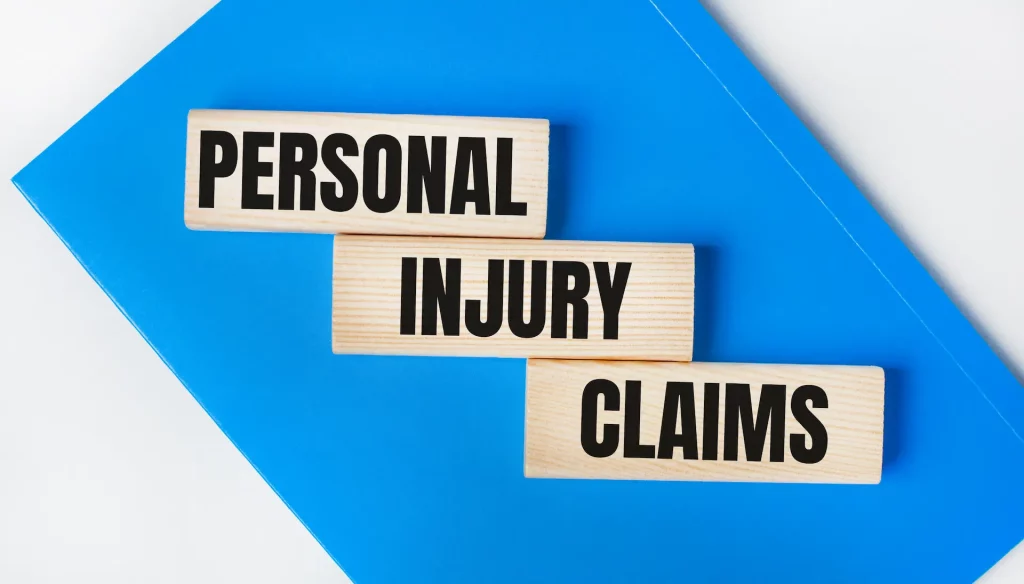What is a Personal Injury Claim?

Imagine this: You’re going about your day, minding your own business, when suddenly, out of nowhere, you find yourself in a dangerous situation that leaves you injured and suffering. Situations like these can lead to personal injury claims, a legal process that seeks to provide justice and compensation for those injured by someone else’s negligent or intentional conduct.
Keep reading to learn about the intricacies of personal injury claims, their purpose, the steps involved, and the importance of seeking professional legal assistance.
What is a Personal Injury Claim?
A personal injury claim is a legal process through which an individual seeks compensation for injuries and damages caused by another party’s negligence or intentional actions. Whether it’s a car accident, slip and fall incident, or medical malpractice, personal injury claims allow victims to receive compensation for their financial losses and obtain justice for their injuries.
Types of Personal Injury Claims
Understanding the various types of claims that fall under the legal umbrella of personal injury is essential. Each type caters to unique situations and wrongs experienced by individuals. Recognizing these categories can help you better approach a potential case with an informed perspective, whether it involves you or someone close to you. Here are the most common types of personal injury claims:
- Workplace accidents
- Car accidents
- Trucking Accidents
- Slip and fall accidents
- Medical malpractice
- Product liability
- Dog bites
- Wrongful death
It’s important to note that this is not an exhaustive list. Consulting with an experienced personal injury attorney is essential to determine the legal options available.
Filing a Personal Injury Claim
Filing a personal injury claim isn’t a process to undertake casually; multiple essential steps are involved:
File a Complaint: The first step is drafting and filing your complaint with the relevant court, which outlines the basis for your claim, identifying both parties alongside specific allegations against the at-fault parties.
Serve The Defendant: After filing, you need to formally notify or “serve” the defendant with the complaint to inform them of the lawsuit so they have an opportunity to respond.
Defendant’s Answer: Once the defendant is served, they must respond to your claim by admitting or denying its contents. This forms a critical part of shaping what issues will be actively contested in the proceeding.
Discovery Process: Following the filing of a response, you’ll undergo what’s referred to as discovery – this is when both parties share information and evidence pertinent to the case. During this stage, documents like witness statements, medical reports, and financial records are exchanged between the parties preparation for trial. During this stage of the process depositions of the parties and witnesses may be taken. This is an opportunity for the attorneys for all of the parties to question the parties and witnesses under oath.
Negotiations: Upon reviewing the evidence gathered from discovery, involved parties might attempt to negotiate a settlement instead of proceeding to trial. This step involves discussions between your attorney and the defendant’s in an effort to agree on a suitable compensation amount.
Trial: If negotiations fail, your case will proceed to trial, where arguments are presented before the judge and jury who ultimately decides on liability and compensation.
Every personal injury claim is unique, and the specific steps and timeline may vary. Seeking the guidance of a personal injury attorney can significantly enhance your chances of a successful claim and fair compensation for your injuries and losses.
Dos and Don’ts: Navigating the Nuances of a Personal Injury Suit
Maneuvering through a personal injury lawsuit comes with its own set of complexities. Here are some indispensable dos and don’ts to guide you in successfully navigating these claims:
DO File an Immediate Report
Whether by dialing 911 or completing necessary forms in cases like workplace incidents or store accidents, be sure to report the accident promptly.
DON’T Delay Medical Assistance
Seeking immediate medical treatment isn’t just essential for your health; it also impacts the strength of your case. A delay may suggest to insurance companies or juries that perhaps your injuries were not as serious as you’re claiming and can negatively affect any compensation you may be entitled to receive.
DO Work with a Lawyer
This is of critical importance as a personal injury attorney understands legal complexities, negotiation strategies, and procedural rules involved in personal injury claims. They can expertly guide you through the claim process while ensuring your rights are protected.
DON’T Provide Recorded Statements without Legal Counsel
It’s vital to refrain from giving recorded statements to the insurance company before consulting an attorney. Insurance companies may try to elicit misleading statements from you to confuse the issues. Anything you say can be used against you at later stages in ways that might harm your claim.
DO Collect Evidence When Possible
Gathering evidence significantly strengthens your claim. Evidence could include photos of the accident scene and injuries, witness testimonies, medical reports, and financial documents proving monetary loss. You should collect any evidence you can, but your attorney will help you with this as well.
DON’T Admit Fault
Even if you think you may share some responsibility for the accident, don’t admit fault or guilt at any stage of proceedings, as this may severely compromise your case. Wait to talk with an attorney who can help you evaluate the facts and relevant laws before coming to a determination of fault or responsibility.
DO Understand Comparative Negligence Laws
In Texas, the modified comparative negligence system makes it possible to file a lawsuit for damages even if you bear some responsibility for an accident. However, your awarded compensation will be reduced proportionately by your individual percentage of fault.
It’s crucial to note that you’ll be ineligible to recover any damages if you’re found over 50% at fault.
Keeping these dos and don’ts in mind can significantly affect the outcome of your personal injury claim. Carefully navigating through each stage while consulting trusted legal representation will ensure you’re well-armed in your pursuit of fair compensation.

Statute of Limitations For Personal Injury Claims in Texas
The statute of limitations is a legally prescribed time limit within which an injured party must initiate their claim.
In Texas, the statute of limitations for most personal injury claims is two years from the accident date. However, certain situations give rise to exceptions that can extend or shorten the deadline. For example, cases involving minors may have a longer deadline.
If you fail to file your claim on time, you will be barred from recovering any compensation, regardless of how strong your case would have been.
To ensure you comply with the statute of limitations, it’s advisable to consult with a qualified attorney who specializes in the relevant area of law.
How Much is a Personal Injury Claim Worth?
The value of a personal injury claim can vary and largely depends on the specifics of your situation. There’s no standard “one size fits all’ answer, but the value typically hinges on the following factors:
- The severity of the injury
- Whether the injury is temporary or permanent
- The medical expenses incurred due to your injuries,
- Lost income and earning capacity
- Personal property damaged or destroyed due to the incident
- The extent of non-economic damages, like pain and suffering and emotional distress experienced as a result of the accident
- The strength of the evidence
- Whether you as the victim are partially responsible for the accident and your injuries
- The insurance policies of the responsible party,
As you can see, many factors play a role in determining the value of your personal injury claim. The best way to make this determination is to work with an experienced personal injury attorney who can make this calculation and ensure you get what you’re entitled to.
Do You Need a Personal Injury Lawyer?
Yes, securing a personal injury lawyer is generally advisable when filing a claim. These attorneys are well-versed in personal injury laws and have extensive experience negotiating with insurance companies.
They can accurately estimate the value of your claim based on your particular circumstances and fight tirelessly to recover the maximum compensation available for you.
Should you find yourself dealing with a personal injury, remember that you never have to face it alone. Reach out to a knowledgeable personal injury attorney who can provide the expertise and support you need to navigate the complexities of the legal system and help you achieve the best possible outcome for your personal injury claim.
Contact The Callahan Law Firm today for a free case review with a Houston personal injury attorney.
FAQs
Q: What is the meaning of a personal injury claim?
A: A personal injury claim is a legal process through which an individual seeks compensation for injuries and damages caused by another party’s negligence or intentional actions.
Q: How do I know if I have a personal injury claim?
A: Identifying whether you have a valid personal injury claim often centers around establishing negligence, proving that another party failed in their duty to act responsibly or safely, resulting in your injury.
However, it’s critical to understand that each case is unique with complexities best understood through consultation with an experienced attorney.
Q: What is the liability for personal injury?
Liability in the context of a personal injury claim refers to legal responsibility for harm caused. This is typically determined by establishing negligence. The party identified as liable can vary depending upon the circumstances of the accident; it could be an individual (like another driver or a property owner), an entity (such as a business failing to ensure safe premises), or even governmental bodies under certain conditions.
Q: What does damages for personal injury mean?
A: Damages in a personal injury case refer to financial compensation that an injured party may receive as a result of the harm suffered. There are three primary categories of damages:
Economic: This covers out-of-pocket expenses that can be easily quantified, like medical bills, property damage, and lost wages.
Non-economic: This addresses less tangible harms such as pain and suffering, loss of enjoyment in life, and loss of consortium.
Punitive: Punitive damages are financial penalties imposed on a defendant to penalize particularly egregious conduct, aiming to deter similar future behavior.

Michael S Callahan is an attorney and founder of The Callahan Law Firm. He focuses his practice on representing individuals and families in personal injury cases involving motor vehicle and truck accidents, workplace accidents and defective products. With over 25 years of experience, he is dedicated to fighting on behalf of people whose lives have been forever altered by the negligence and carelessness of corporations and individuals. Originally trained as a mechanical engineer, Michael has been practicing law and fighting for justice for those who need it most since 1994. He is board-certified in Personal Injury Trial Law by the Texas Board of Legal Specialization and a member of various esteemed legal associations. Outside of work, Michael enjoys spending quality time with his family, outdoor activities, and continually striving to improve as a trial lawyer and human being.











